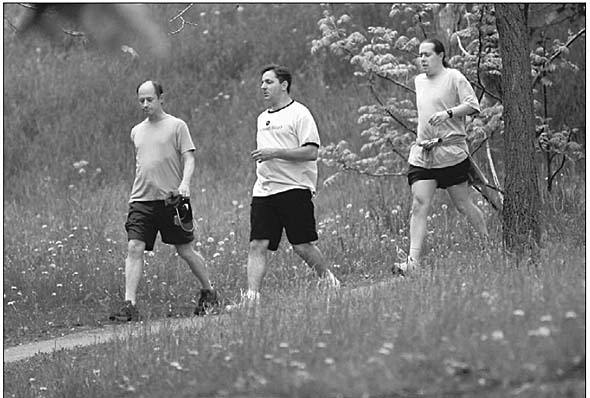|
Are exercise habits contagious?
JILL BARKER, The Gazette
Published: 16 March 2010
BIRDS OF A FEATHER - Friends often steer our restaurant and movie choices. They can also help us stay fit
Having trouble making exercise a habit? Try making friends with a fitness fanatic. The idea that friends influence your actions isn’t new – think back to high school when you and your buddies all sported the same hairstyle or the same style of jeans. What is new is the idea that friends can be make you slimmer, happier and even more fit.
 JOHN KENNEY GAZETTE FILE PHOTO JOHN KENNEY GAZETTE FILE PHOTO
Marcel David (from left), André Michaud and Benoit Fredette get some exercise together on Mount Royal.
Researchers Nicholas Christakis and James Fowler made headlines a few years ago when they concluded that friends have an even more profound influence on behaviour than originally thought. The study, published in the New England Journal of Medicine, used data from the Framington Heart Study to track the social connections of 12,000 people over 32 years. What they found is that behaviours and conditions like drinking, smoking, obesity and happiness spread between friends.
The newly coined term for this phenomenon is “social contagion” which implies that behaviour is contagious. This spread of behaviours goes beyond that of one friend inviting another friend to go for a walk or run. The truly interesting finding in this study is that it’s not just direct behaviours that change but the ability for social norms to be affected through the influence of friends.
In other words, someone who exercises regularly influences those around him to do the same, who in turn influence their friends to exercise and so on. So if your friend goes to the gym, the probability increases significantly that you will eventually do the same. And while the response was the greatest between close friends, friends of friends and even friends of their friends also have the potential to be influenced by a change in behaviour.
Christakis coined this phenomenon as a “social chain reaction.” Christakis and Fowler suggest that friends seem to be more responsive to this type of contagious behaviour than spouses, family, co-workers or neighbours. They also noted that distance doesn’t limit the contagion effect. What is a factor is whether or not we like and respect the friend, as we are more likely to adopt the habits of those people we hold in high regard than those we don’t.
Health officials have jumped on this idea in the hopes that they can use the findings to influence positive behaviour changes within an increasingly inactive and obese society. The idea is that if you can get one person to exercise, it can lead to similar changes in exercise habits within that person’s circle of friends who will then effect change in their circle of friends, and so on, until large-scale change is made.
McGill University psychologist Donald Taylor is an expert on social norms. He acknowledges the work of Christakis and Fowler but says there are two types of norms at work within their premise; societal norms and the norms within a circle of friends.
Within North American society, exercise is already acknowledged as beneficial and therefore considered a societal norm. Within individual circles of friends, however, exercise may not be part of the norm. It’s within this smaller framework of friends that individuals are best able to effect change – but not without effort.
In fact, before any change of behaviour can stick, individuals will likely have to endure resistance from their friends.
“If a group of buddies are all couch potatoes and one of them decides to exercise, the others in the group will find 100 ways to put the guy off and sabotage his routine,” said Taylor.
When faced with such resistance, individuals have two choices: continue exercising despite the friendly push back or find a new set of friends who share the same set of norms.
“The couch potato lifestyle is very attractive,” admitted Taylor. “Without persistence by the leader, it is unlikely that friends will give up their current lifestyle in favour of more exercise.” Taylor says the leader of change has to stay the course in order for behaviour within the group to change.
“If he sticks with it, there is no doubt that change will happen,” he said.
According to Christakis and Fowler, change within a circle of acquaintances occurs when friends begin to accept the change as normal and start adopting the new behaviour. This is often done almost unconsciously, which is the power of friendly influence. The ability for one person to make a difference has big implications – especially when it comes to selling exercise. Knowing that you can influence your circle of friends and your friends’ friends to adopt a more active lifestyle makes your exercise habit that much more significant.
So add the ability to initiate healthy change in those around you as another reason to exercise. Healthy friends are ones who will be with you forever, so go ahead and sell the benefits of exercise to those around you. Friends don’t let friends sit on the couch.
[email protected]
|



